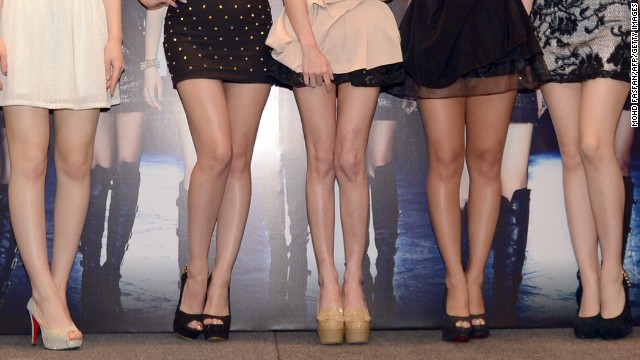No more miniskirts in Seoul? New law has South Korea buzzing, CELEBRITIES WORRIED
No more miniskirts in Seoul? New law has South Korea buzzing
March 25, 2013 -- Updated 0633 GMT (1433 HKT)

'No pants' no more? South Koreans are worried pop girl groups, like T-ara shown here, may have to add to their wardrobe.
STORY HIGHLIGHTS
- Fines of 50,000 KRW (US$45) for "overexposure"
- Law goes into effect March 22
- Celebrities worried they won't be able to wear skimpy outfits
- Police say law only fines public nudity and indecency
These questions have
charged social media this week in South Korea ahead of a revised
"overexposure law" that goes into effect on March 22.
Under the decree,
approved by the new government during President Park Geun-hye's first
Cabinet meeting earlier this month, people deemed to be "overexposed" in
public will be subject to a fine of 50,000 KRW (US$45).
When the new legislation
was announced, many residents assumed it meant restrictions on revealing
outfits that are prevalent on the streets of Seoul and other South
Korean cities.
The so-called "no pants"
look has become a fashion staple, with women ditching pants and skirts
for leggings, stocking or barely-there microshorts.
Revealing outfits are
pretty much the only dress code for female K-Pop singers. A number of
music videos have recently been slapped with 19-and-over-only viewing
restrictions.
Celebrities known for their sexy image have taken to social media to voice their concern -- some serious, some only half-joking.
"Is the overexposure fine for real? I'm so dead," tweeted Lee Hyori, the country's most famous sex symbol.
Performance artist and media personality Nancy Lang tweeted a photo of herself waving a 50,000 KRW bill next to her cleavage.
Some have drawn
comparisons to similar restrictions imposed by Park Chung-hee (the
current President Park's late father), who headed the country from 1963
to 1979.
In the 1970s, skirts that ended 20 centimeters above the knee or higher were prohibited in South Korea.
This week, opposition
political figures have criticized the amendment, branding the law an
infringement on freedom of expression.
"Why does the state interfere with how citizens dress?" tweeted Democratic United Party member Ki Sik Kim, according to the Donga Ilbo newspaper.
"Park Geun-hye's
government gives cause for concern that we are returning to the era when
hair length and skirt length were regulated."
But is this really about salacious fashion?
Police have said the overexposure fine doesn't have anything to do with skirt length or revealing outfits in general.
"This amendment is for
cases like public nudity and public indecency," Inspector Ko Jun-ho of
the National Police Agency told CNN.
"Any reports that we will be regulating what people are wearing are completely false."
Local media are also
reporting on the spread of misinformation, criticizing politicians like
Kim for vocalizing their opinion without fully understanding the revised
law.
Authorities say they're working on increasing awareness of the amendment's true purpose.
So it's possible South Koreans can put away their rulers. Their hemlines may yet be safe.

Comments
Post a Comment